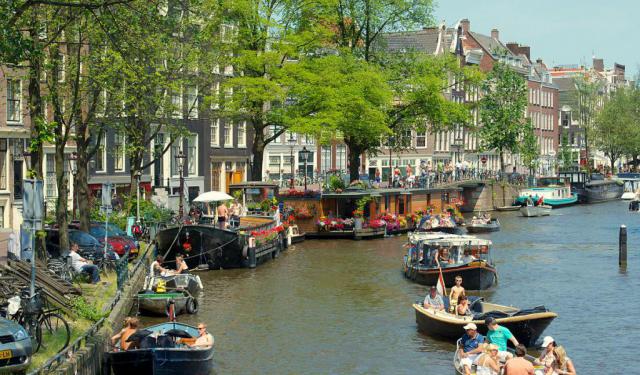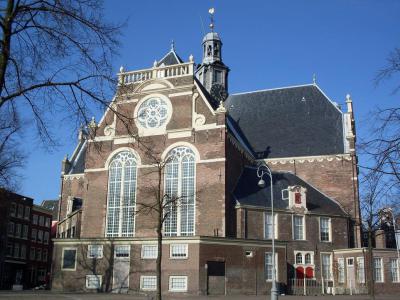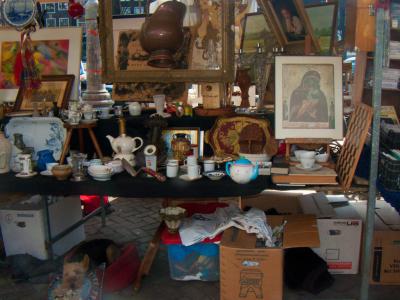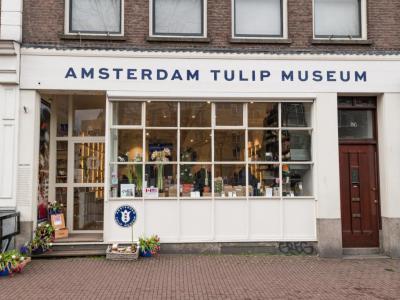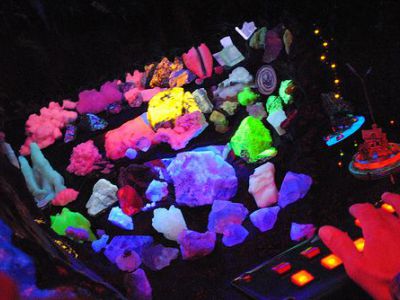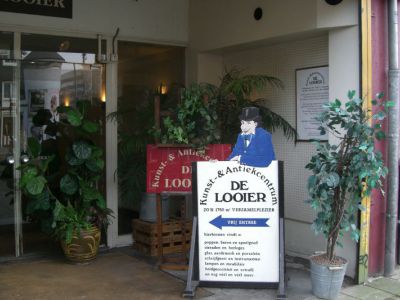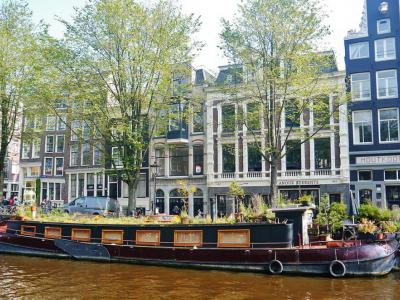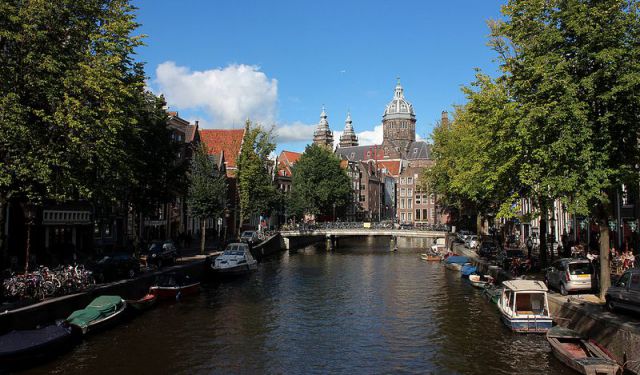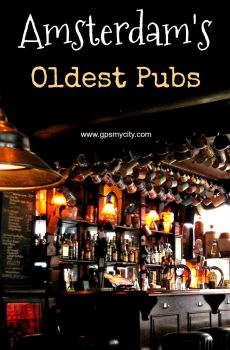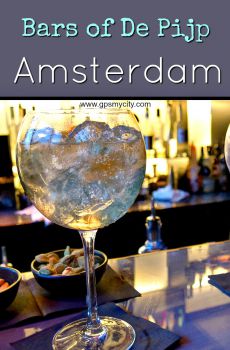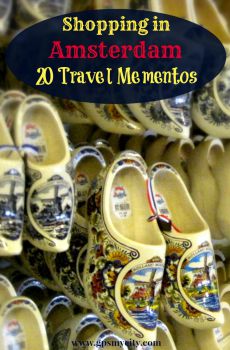Jordaan Walking Tour (Self Guided), Amsterdam
The Jordaan district of Amsterdam is a popular neighborhood renowned for its charming, narrow streets, quaint courtyards, and picturesque canals. Replete with beautiful historic houses, many of which have been converted into cozy cafés, trendy boutiques, and art galleries, this district has a distinctive atmosphere that sets it apart from other areas in the city.
The Jordaan was originally developed in the 17th century as a working-class area, which over time has evolved into a lively and diverse neighborhood, retaining much of its original character, and becoming an iconic symbol of Amsterdam's cultural heritage.
One of the notable landmarks in the Jordaan is the Noorderkerk (North Church), a beautiful Protestant temple built in the early 17th century, known for its unique design. Adjacent to the Noorderkerk is Noordermarkt, a vibrant square that hosts a popular farmer's market every Saturday – a great place to experience the local culture and taste delicious Dutch treats.
The Tulip Museum, just a few blocks away, is dedicated to the history and significance of tulips in Dutch culture, while another unique museum in the district, Electric Ladyland, focuses on fluorescent art and the concept of perception.
Moeders, which means "mothers" in Dutch, is a popular local restaurant known for its homely atmosphere and traditional Dutch cuisine. For antique lovers, the De Looier Antiekcentrum Amsterdam, a large antique center, is a must-visit destination in the Jordaan. Lastly, the Houseboat Museum, housed in an actual houseboat, offers a glimpse into the unique way of living in Amsterdam.
"De Jordaanse gezelligheid" (Jordaan friendliness) – This expression refers to the warm and cozy atmosphere that is characteristic of the Jordaan district. It signifies the sense of community, conviviality, and hospitality that the neighborhood is known for. If you wish to experience the welcoming ambiance and capture the essence of the Jordaan district first-hand, take this self-guided walk.
The Jordaan was originally developed in the 17th century as a working-class area, which over time has evolved into a lively and diverse neighborhood, retaining much of its original character, and becoming an iconic symbol of Amsterdam's cultural heritage.
One of the notable landmarks in the Jordaan is the Noorderkerk (North Church), a beautiful Protestant temple built in the early 17th century, known for its unique design. Adjacent to the Noorderkerk is Noordermarkt, a vibrant square that hosts a popular farmer's market every Saturday – a great place to experience the local culture and taste delicious Dutch treats.
The Tulip Museum, just a few blocks away, is dedicated to the history and significance of tulips in Dutch culture, while another unique museum in the district, Electric Ladyland, focuses on fluorescent art and the concept of perception.
Moeders, which means "mothers" in Dutch, is a popular local restaurant known for its homely atmosphere and traditional Dutch cuisine. For antique lovers, the De Looier Antiekcentrum Amsterdam, a large antique center, is a must-visit destination in the Jordaan. Lastly, the Houseboat Museum, housed in an actual houseboat, offers a glimpse into the unique way of living in Amsterdam.
"De Jordaanse gezelligheid" (Jordaan friendliness) – This expression refers to the warm and cozy atmosphere that is characteristic of the Jordaan district. It signifies the sense of community, conviviality, and hospitality that the neighborhood is known for. If you wish to experience the welcoming ambiance and capture the essence of the Jordaan district first-hand, take this self-guided walk.
How it works: Download the app "GPSmyCity: Walks in 1K+ Cities" from Apple App Store or Google Play Store to your mobile phone or tablet. The app turns your mobile device into a personal tour guide and its built-in GPS navigation functions guide you from one tour stop to next. The app works offline, so no data plan is needed when traveling abroad.
Jordaan Walking Tour Map
Guide Name: Jordaan Walking Tour
Guide Location: Netherlands » Amsterdam (See other walking tours in Amsterdam)
Guide Type: Self-guided Walking Tour (Sightseeing)
# of Attractions: 7
Tour Duration: 1 Hour(s)
Travel Distance: 2.4 Km or 1.5 Miles
Author: DanaOffice
Sight(s) Featured in This Guide:
Guide Location: Netherlands » Amsterdam (See other walking tours in Amsterdam)
Guide Type: Self-guided Walking Tour (Sightseeing)
# of Attractions: 7
Tour Duration: 1 Hour(s)
Travel Distance: 2.4 Km or 1.5 Miles
Author: DanaOffice
Sight(s) Featured in This Guide:
- Noorderkerk (Northern Church)
- Noordermarkt (Northern Market)
- Tulip Museum
- Electric Ladyland – Museum of Fluorescent Art
- Moeders Restaurant
- Antiekcentrum Amsterdam (Antiques Center)
- Woonbootmuseum (Houseboat Museum)
1) Noorderkerk (Northern Church)
The Northern Church stands prominently at the intersection of Noordermarkt (Northern Market), serving as a notable landmark within the neighborhood. This unadorned church holds historical significance as one of the earliest constructions following the Protestant Reformation and represents the final architectural work attributed to Hendrick de Keyser. Surprisingly distinct in style from his other notable churches in the city, namely the Southern and Western churches, it was erected to cater to the impoverished residents of the Jordaan neighborhood. It takes the form of an austere brick structure, characterized by its short spire and bulky, somewhat imposing appearance-a stark departure from the prevailing church designs of the era.
Constructed with a stark, austere appearance, it featured a squat spire and a rather imposing, bulky structure, deviating radically from the conventional church architectural norms of its time. Notably, it adopted a symmetrical Greek cross floor plan, with four arms of equal dimensions extending from a central steeple. This unyieldingly somber design underscored the solemn commitment of the Calvinist congregation that gathered here. The positioning of the pulpit at the center, rather than the front of the church, symbolized a deliberate departure from Catholic traditions.
Visitors can enjoy weekly concerts at Noorderkerk every Saturday at 2pm, scheduled from June to September.
Constructed with a stark, austere appearance, it featured a squat spire and a rather imposing, bulky structure, deviating radically from the conventional church architectural norms of its time. Notably, it adopted a symmetrical Greek cross floor plan, with four arms of equal dimensions extending from a central steeple. This unyieldingly somber design underscored the solemn commitment of the Calvinist congregation that gathered here. The positioning of the pulpit at the center, rather than the front of the church, symbolized a deliberate departure from Catholic traditions.
Visitors can enjoy weekly concerts at Noorderkerk every Saturday at 2pm, scheduled from June to September.
2) Noordermarkt (Northern Market)
Amsterdam's Northern Market boasts a rich history spanning almost four centuries, tracing its origins back to the 17th century. Despite its long-standing heritage, the vendors here have embraced the needs of today's consumers, making it an internationally appealing market that exudes a warm and inviting atmosphere, captivating countless visitors and offering an unforgettable experience.
This market operates on Monday mornings and Saturdays, presenting an extraordinary array of merchandise that cannot be found anywhere else in Amsterdam. The diversity of products is truly remarkable, encompassing antiques, oddities, books, prints, unique textiles, glassware, pottery, custom-designed jewelry, vintage apparel, paintings, graphics, recycled canvas bags, and much more.
Saturdays at the market come alive with the addition of a Bird Market and a Farmers' Market, offering organically grown fruits and vegetables, freshly baked bread, and an extensive array of oils and spices. Concurrently, a dedicated section showcases antiques, vintage items, clothing, small furniture pieces, and a distinctive collection of semi-precious stones, prints, jewelry bags, and more. Saturdays are bustling market days, immersing visitors in a vibrant and diverse atmosphere.
On Monday mornings, the place transforms into a traditional textiles and second-hand market, providing a unique opportunity to peruse and purchase the finest textiles in Amsterdam. Visitors will discover ample inspiration among the various fabrics available.
This market operates on Monday mornings and Saturdays, presenting an extraordinary array of merchandise that cannot be found anywhere else in Amsterdam. The diversity of products is truly remarkable, encompassing antiques, oddities, books, prints, unique textiles, glassware, pottery, custom-designed jewelry, vintage apparel, paintings, graphics, recycled canvas bags, and much more.
Saturdays at the market come alive with the addition of a Bird Market and a Farmers' Market, offering organically grown fruits and vegetables, freshly baked bread, and an extensive array of oils and spices. Concurrently, a dedicated section showcases antiques, vintage items, clothing, small furniture pieces, and a distinctive collection of semi-precious stones, prints, jewelry bags, and more. Saturdays are bustling market days, immersing visitors in a vibrant and diverse atmosphere.
On Monday mornings, the place transforms into a traditional textiles and second-hand market, providing a unique opportunity to peruse and purchase the finest textiles in Amsterdam. Visitors will discover ample inspiration among the various fabrics available.
3) Tulip Museum
Amsterdam Tulip Museum is a privately owned museum dedicated solely to the history of the Netherlands' most infamous flower – the tulip – and its profound impact on the nation's economy.
Tulips made their way to the Netherlands and the rest of Europe from the Ottoman Empire during the mid-16th century. This delicate bloom quickly captivated the attention of the aristocracy and was brought to Dutch soil for cultivation. The flowers soared in popularity, particularly among the elite, and became a symbol of high social standing.
The scarcer the flower's color, the more valuable its bulb was. Variations in color, petal structure, and other characteristics sent the flower's price soaring to unprecedented heights. In some cases, historical records indicate that individuals were willing to part with up to ten times their annual income for a single tulip bulb. This period, now referred to as "Tulip Mania", reached its zenith in 1637 and inflicted severe damage on the Dutch economy, earning the tulip the moniker of the "world's most dangerous flower".
The Tulip Museum – located in a canal house (just across the bridge from the Anne Frank House) – was established in 2004 by three Dutch bulbsmen. Though small in size (just 200 square meters of floor space), it is quite informative and packed to the brim with everything one needs to become a tulip addict. The collection traces the history of tulips from their origins in the Himalayas to their arrival in the court of the Ottoman Sultan Suleiman the Magnificent.
Among the exhibits, the museum features Ottoman-style Tulip-themed art and ceramics, bulb industry artifacts, and films about tulips. It also offers multimedia presentations which are viewable on LCD screens.
Tip:
The cute gift shop at the entrance is stocked with a variety of intriguing souvenirs.
Additionally, it's renowned as one of the select places offering "certified" bulbs suitable for the UK, USA, and Canada.
Also, at the nearby Cheese Museum, you can get your fill of cheese just as well!
Tulips made their way to the Netherlands and the rest of Europe from the Ottoman Empire during the mid-16th century. This delicate bloom quickly captivated the attention of the aristocracy and was brought to Dutch soil for cultivation. The flowers soared in popularity, particularly among the elite, and became a symbol of high social standing.
The scarcer the flower's color, the more valuable its bulb was. Variations in color, petal structure, and other characteristics sent the flower's price soaring to unprecedented heights. In some cases, historical records indicate that individuals were willing to part with up to ten times their annual income for a single tulip bulb. This period, now referred to as "Tulip Mania", reached its zenith in 1637 and inflicted severe damage on the Dutch economy, earning the tulip the moniker of the "world's most dangerous flower".
The Tulip Museum – located in a canal house (just across the bridge from the Anne Frank House) – was established in 2004 by three Dutch bulbsmen. Though small in size (just 200 square meters of floor space), it is quite informative and packed to the brim with everything one needs to become a tulip addict. The collection traces the history of tulips from their origins in the Himalayas to their arrival in the court of the Ottoman Sultan Suleiman the Magnificent.
Among the exhibits, the museum features Ottoman-style Tulip-themed art and ceramics, bulb industry artifacts, and films about tulips. It also offers multimedia presentations which are viewable on LCD screens.
Tip:
The cute gift shop at the entrance is stocked with a variety of intriguing souvenirs.
Additionally, it's renowned as one of the select places offering "certified" bulbs suitable for the UK, USA, and Canada.
Also, at the nearby Cheese Museum, you can get your fill of cheese just as well!
4) Electric Ladyland – Museum of Fluorescent Art
This quaint shop, adorned with a vibrant floral window display, proudly dubs itself as "The First Museum of Fluorescent Art". Despite the quirky exterior, it conceals a brilliantly illuminated wonderland within its walls. Tucked away beneath the shop, accessible only by a steep set of stairs and available for visits by appointment, lies a small exhibition of black-light art. The mastermind behind this unique creation is Nick Padalino, an individual who has discovered his true calling in life. He takes great pleasure in personally showcasing the unexpected fluorescence found in a myriad of objects, ranging from minerals to stamps, candy, and even the tattoo on his arm.
The moment the black light is switched on, handcrafted shapes burst into vivid life, and every surface radiates a neon phosphorescence, leaving visitors spellbound by the mesmerizing technicolor display. A fascinating highlight is the opportunity to gaze upon the historic first fluorescent crayon from San Francisco in the 1950s, its label humorously stating, "Use with black light for church groups".
The museum encourages guests to explore the psychedelic environment at their own pace, fostering what the proprietors affectionately term "participatory art."
The moment the black light is switched on, handcrafted shapes burst into vivid life, and every surface radiates a neon phosphorescence, leaving visitors spellbound by the mesmerizing technicolor display. A fascinating highlight is the opportunity to gaze upon the historic first fluorescent crayon from San Francisco in the 1950s, its label humorously stating, "Use with black light for church groups".
The museum encourages guests to explore the psychedelic environment at their own pace, fostering what the proprietors affectionately term "participatory art."
5) Moeders Restaurant
Moeders is an authentic Dutch eatery nestled in the heart of Amsterdam, renowned for its warm and inviting ambiance and its dedication to honoring the role of mothers in Dutch society – hence the name "Moeders", which means Mothers in Dutch.
Inside Moeders, the walls are adorned with an extensive collection of photographs featuring mothers, grandmothers, and other cherished women, all contributed by the restaurant's patrons. Additionally, you'll find an array of sentimental keepsakes, including plates, teapots, and various kitchen utensils, that gives it that warm, homey feeling.
Moeders' menu boasts a delectable array of traditional Dutch fare, including mashed potatoes with veggies ("stamppot"), a hearty carrot and onion stew ("hutspot"), and succulent meatballs ("gehaktballen"). To wash it down, they've got Dutch beers and spirits, including the famous Dutch gin called "jenever".
One standout feature is the "mothers table," a generously sized communal dining area where guests can gather and share a meal with fellow diners. It's decked out with all kinds of vintage kitchen implements and nostalgic items, making it feel super cozy and inviting.
Moeders has been a go-to spot in Amsterdam since it opened back in 1990. People love it for its charming ambiance and yummy food that's all about traditional flavors. So, if you want to dive into Dutch cuisine and soak up some Netherlands culture, this is the spot.
Tip:
Make sure to book a table ahead of time before making the trek over there.
Inside Moeders, the walls are adorned with an extensive collection of photographs featuring mothers, grandmothers, and other cherished women, all contributed by the restaurant's patrons. Additionally, you'll find an array of sentimental keepsakes, including plates, teapots, and various kitchen utensils, that gives it that warm, homey feeling.
Moeders' menu boasts a delectable array of traditional Dutch fare, including mashed potatoes with veggies ("stamppot"), a hearty carrot and onion stew ("hutspot"), and succulent meatballs ("gehaktballen"). To wash it down, they've got Dutch beers and spirits, including the famous Dutch gin called "jenever".
One standout feature is the "mothers table," a generously sized communal dining area where guests can gather and share a meal with fellow diners. It's decked out with all kinds of vintage kitchen implements and nostalgic items, making it feel super cozy and inviting.
Moeders has been a go-to spot in Amsterdam since it opened back in 1990. People love it for its charming ambiance and yummy food that's all about traditional flavors. So, if you want to dive into Dutch cuisine and soak up some Netherlands culture, this is the spot.
Tip:
Make sure to book a table ahead of time before making the trek over there.
6) Antiekcentrum Amsterdam (Antiques Center)
Antiekcentrum Amsterdam goes beyond being just your average antique store – it's a sprawling labyrinth filled with historical knick-knacks, and the best part is, everything you see is up for sale. Standing in the heart of the charming Jordaan district, this place spans a whopping 1700 square meters, making it the largest antique market in the Netherlands.
You'll stumble upon a vast array of unique treasures from various time periods and styles, including antiques from the 17th, 18th, and 19th centuries, Art Deco gems, and vintage finds. With 55 specialized antique dealers showcasing their collections, visitors can embark on a constantly changing and awe-inspiring journey through displays of jewelry, elegant lighting, silverware, miniatures, fine tableware, military memorabilia, toys, ceramics, porcelain, Murano glass, Delft Blue ceramics, paintings, wall art, and petite pieces of furniture.
What's more, this center is renowned for its welcoming and well-informed staff, always eager to assist visitors in their quest to find that perfect antique piece.
Tip:
While you're in the neighborhood, take a stroll down Elandsgracht, where you'll discover a plethora of specialty food shops, including a top-notch butcher and bakery. And don't forget to explore Hazenstraat, the adjacent street, which is home to a fantastic array of art galleries and other unique shops.
You'll stumble upon a vast array of unique treasures from various time periods and styles, including antiques from the 17th, 18th, and 19th centuries, Art Deco gems, and vintage finds. With 55 specialized antique dealers showcasing their collections, visitors can embark on a constantly changing and awe-inspiring journey through displays of jewelry, elegant lighting, silverware, miniatures, fine tableware, military memorabilia, toys, ceramics, porcelain, Murano glass, Delft Blue ceramics, paintings, wall art, and petite pieces of furniture.
What's more, this center is renowned for its welcoming and well-informed staff, always eager to assist visitors in their quest to find that perfect antique piece.
Tip:
While you're in the neighborhood, take a stroll down Elandsgracht, where you'll discover a plethora of specialty food shops, including a top-notch butcher and bakery. And don't forget to explore Hazenstraat, the adjacent street, which is home to a fantastic array of art galleries and other unique shops.
7) Woonbootmuseum (Houseboat Museum)
Amsterdam continually amazes its visitors with its waterways replacing conventional roads and boats serving as a primary mode of urban transportation. While houseboats are common, they also hold a certain fascination that embodies the Amsterdam lifestyle. Questions naturally arise: How do people manage to live on water? Is it practical? What about essential amenities like electricity and waste disposal? These are just a few of the queries that come to mind.
Established in 1997 by Vincent Van Loon, himself a houseboat owner, the Houseboat Museum is the ideal place to quench your curiosity. Open to the public year-round, except during the winter months, it is set within an elegantly restored Dutch houseboat dating to 1914, offering visitors a unique window into the lifestyle and daily routines of those who call the waterways home. Surprisingly, these floating residences exude a homely vibe that rivals traditional brick and stone houses. Featuring spacious living areas, bunk beds, kitchens, and bathrooms, you'll be astonished by how they provide warmth, comfort, and a sense of home without sacrificing space. A few informative plaques provide insights into life on the water, and if you're particularly enthused, you can even purchase a book on the subject.
Established in 1997 by Vincent Van Loon, himself a houseboat owner, the Houseboat Museum is the ideal place to quench your curiosity. Open to the public year-round, except during the winter months, it is set within an elegantly restored Dutch houseboat dating to 1914, offering visitors a unique window into the lifestyle and daily routines of those who call the waterways home. Surprisingly, these floating residences exude a homely vibe that rivals traditional brick and stone houses. Featuring spacious living areas, bunk beds, kitchens, and bathrooms, you'll be astonished by how they provide warmth, comfort, and a sense of home without sacrificing space. A few informative plaques provide insights into life on the water, and if you're particularly enthused, you can even purchase a book on the subject.
Walking Tours in Amsterdam, Netherlands
Create Your Own Walk in Amsterdam
Creating your own self-guided walk in Amsterdam is easy and fun. Choose the city attractions that you want to see and a walk route map will be created just for you. You can even set your hotel as the start point of the walk.
Amsterdam Introduction Walking Tour
The Dutch capital, Amsterdam, some say, “dances to its own beat.” Indeed, Amsterdam – where “hipness meets history” – has a rather unusual life rhythm and style, famously manifested in the air of legalized cannabis, coffee shops, and the Red Light District. In large part, this “air of freedom” attracts annually to the city over five million visitors.
As a small fishing village,... view more
Tour Duration: 2 Hour(s)
Travel Distance: 4.0 Km or 2.5 Miles
As a small fishing village,... view more
Tour Duration: 2 Hour(s)
Travel Distance: 4.0 Km or 2.5 Miles
Red Light District Walking Tour
For centuries, Amsterdam’s Red Light District has been a source of endless intrigue. Its heart and the most historic section, De Wallen, is a fascinating blend of medieval charm and modern-day notoriety. Here, you’ll find timeworn canal houses leaning at curious angles, narrow cobblestone alleys lined with old bars, cozy shops, and a sprinkling of late-night establishments. And of course, the... view more
Tour Duration: 1 Hour(s)
Travel Distance: 1.8 Km or 1.1 Miles
Tour Duration: 1 Hour(s)
Travel Distance: 1.8 Km or 1.1 Miles
Southern Canal Belt Walking Tour
The Canal District, known as Grachtengordel in Dutch, is a globally renowned example of urban planning and architectural excellence within Amsterdam. This area has remained remarkably well-preserved for over four centuries, celebrated for its charming small bridges, canal crossings, and 17th-century residences. Encircling the Old City Centre in a horseshoe shape, the Canal Ring encompasses three... view more
Tour Duration: 2 Hour(s)
Travel Distance: 3.1 Km or 1.9 Miles
Tour Duration: 2 Hour(s)
Travel Distance: 3.1 Km or 1.9 Miles
Amsterdam's Historical Churches Walking Tour
The history of Amsterdam is deeply intertwined with its religious heritage. The city is home to several historical churches, each with its own unique charm and significance. These religious sites serve as both spiritual centers and architectural treasures that provide insight into the city's past.
Our walk starts in the Central Station area and leads you to visit the eight most prominent... view more
Tour Duration: 2 Hour(s)
Travel Distance: 3.8 Km or 2.4 Miles
Our walk starts in the Central Station area and leads you to visit the eight most prominent... view more
Tour Duration: 2 Hour(s)
Travel Distance: 3.8 Km or 2.4 Miles
Jewish Quarter Walking Tour
Welcome to Amsterdam’s Jewish Quarter, a neighborhood rich in history, tracing the ebb and flow of the city’s Jewish community. It all began in the late 16th and early 17th centuries, when Sephardic Jews fleeing persecution in Spain and Portugal found refuge here. With its relatively tolerant atmosphere, Amsterdam quickly became a sanctuary, and before long, Ashkenazi Jews from Central and... view more
Tour Duration: 2 Hour(s)
Travel Distance: 2.3 Km or 1.4 Miles
Tour Duration: 2 Hour(s)
Travel Distance: 2.3 Km or 1.4 Miles
Plantage Walking Tour
Amsterdam's Plantage neighborhood has been throughout the centuries a place of rest and entertainment. Beside its impressive 19th-century architecture, there is the historic Royal Zoo, and close-by is the verdantly exotic Hortus Botanicus. Follow this self-guided walk to explore one of the greenest neighborhoods in Amsterdam – a lovely place to stroll and laze.
Tour Duration: 1 Hour(s)
Travel Distance: 1.7 Km or 1.1 Miles
Tour Duration: 1 Hour(s)
Travel Distance: 1.7 Km or 1.1 Miles
Useful Travel Guides for Planning Your Trip
Dutch Sweets and Pastries
Known primarily for their cheeses, the Dutch have proven just as passionate about their sweets and pastries, many of which have come about as a result of the centuries of colonial past that had infused Holland with Oriental flavors and ingredients. Blended with their own dairy-rich European...
The Oldest and Historic Pubs of Amsterdam
Amsterdam is a stunningly beautiful city, steeped in history, with hidden treasures and fascinating tales practically around every corner. Like all marvelous cities, Amsterdam has its share of dining and drinking establishments from the modern to the ancient. This guide will assist you in exploring...
Bars of De Pijp, Amsterdam
Sitting to the south of the Centrum (city centre) De Pijp area of Amsterdam is a fascinating mixture of trendy urbanites, students, immigrants and Amsterdammers. De Pijp has a long history as the Bohemian part of town, which is reflected in the different cafés of the area. There truly is something...
Top 7 Dutch Cheeses to Try in Amsterdam
Don't mind things turning a bit "cheesy" when in Holland. After all, this small country is renowned for its cheese manufacturing and successfully competes, in terms of cheese exports, with such economic giants as the United States and Germany. Amsterdam alone and its vicinities are...
Souvenir Shopping in Amsterdam: 20 Dutch Things To Buy
Tulips, red lights, weed... Other than these, there are plenty of good things to remember Amsterdam by. What's more, you can take home some of them quite legally. Look here to see what to buy in Amsterdam and...
12 Traditional Dutch Foods You Must Try in Amsterdam
Cool climate, closeness to sea, and sense of adventure have made the Dutch what they are – skillful farmers, industrious seafarers and, generally, people with the taste for life and good hearty meal, whether it comes from the sea they live by or the land they set their feet on. All of this has...
The Most Popular Cities
/ view all
